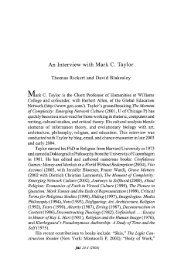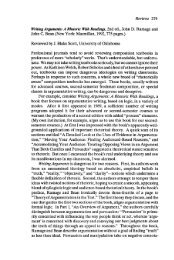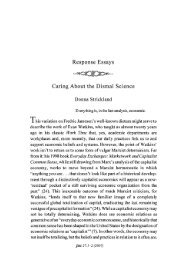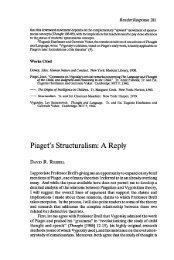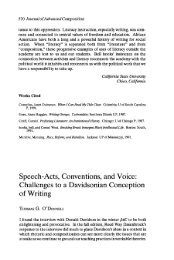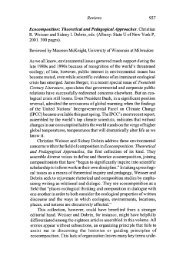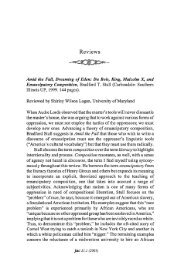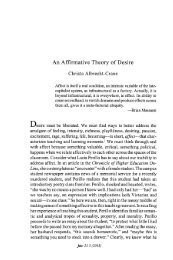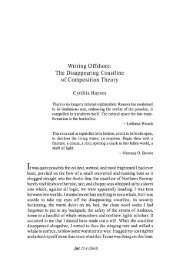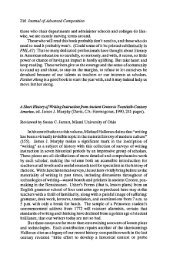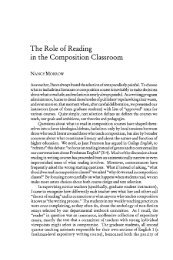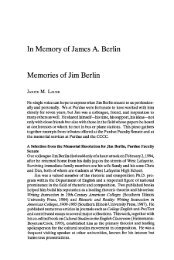Politics, Pedagogy, and the Profession of Composition ... - JAC Online
Politics, Pedagogy, and the Profession of Composition ... - JAC Online
Politics, Pedagogy, and the Profession of Composition ... - JAC Online
Create successful ePaper yourself
Turn your PDF publications into a flip-book with our unique Google optimized e-Paper software.
Bruce Horner 123<br />
ing conceptions has been foregrounded in attempts to address <strong>the</strong> dilemma<br />
<strong>of</strong> how to enact a feminist pedagogy eschewing claims <strong>of</strong> authority<br />
<strong>and</strong> power while operating from a position <strong>of</strong> institutional authority <strong>and</strong><br />
power (as, say, a tenured pr<strong>of</strong>essor). In an echo <strong>of</strong> Bizzell, Carmen Luke,<br />
for example, observes, "Feminist pedagogy, conceptualized as (maternal)<br />
nurture <strong>and</strong> distanced from claims <strong>of</strong> pedagogical authority <strong>and</strong> institutional<br />
power, leaves itself wide open to <strong>the</strong> <strong>the</strong>oretical impossibility <strong>of</strong><br />
having a 'foundation' from which to arbitrate knowledges, student voices<br />
<strong>and</strong> experiences, <strong>and</strong> <strong>the</strong> teacher's own epistemological position" ("Feminist<br />
<strong>Pedagogy</strong>" 284). This dilemma arises at least in part from a conflict<br />
between a notion <strong>of</strong> power relations as inescapable, <strong>and</strong> hence to be<br />
engaged directly, <strong>and</strong> a view <strong>of</strong> power relations as something that can <strong>and</strong><br />
should be escaped. 1<br />
Aside from mixing definitions <strong>of</strong> politics <strong>and</strong> <strong>the</strong> competition among<br />
<strong>the</strong>se definitions, a third <strong>and</strong> more significant source <strong>of</strong> confusion in <strong>the</strong><br />
debate on <strong>the</strong> politics <strong>of</strong> composition stems from <strong>the</strong> failure to underst<strong>and</strong><br />
<strong>the</strong> politics <strong>of</strong> specific acts in terms <strong>of</strong> <strong>the</strong> material conditions <strong>of</strong> <strong>the</strong>ir<br />
specific sites <strong>and</strong> in relation to <strong>the</strong> conditions <strong>of</strong> <strong>the</strong> larger spheres<br />
encompassing those sites. We are only beginning to question, <strong>and</strong><br />
articulate, <strong>the</strong> political effectivity <strong>of</strong> action at one social <strong>and</strong> historical site<br />
in relation to o<strong>the</strong>r sites. Typically, arguments about <strong>the</strong> politics <strong>of</strong><br />
pedagogy, <strong>the</strong> pr<strong>of</strong>ession, <strong>the</strong> academy, or society ei<strong>the</strong>r treat <strong>the</strong>se sites<br />
as discrete or, at best, assume a relation <strong>of</strong> homology among <strong>the</strong>m. Such<br />
arguments frequently invoke a dominant, monolithic, reified notion <strong>of</strong><br />
power, a notion that undermines, by ei<strong>the</strong>r inflating or understating,<br />
pedagogical <strong>and</strong> pr<strong>of</strong>essional politics. Instead <strong>of</strong> viewing power as<br />
relational, power is imagined as a commodity-something some have or<br />
acquire <strong>and</strong> use on o<strong>the</strong>rs, or else something some attempt to share with<br />
or give to o<strong>the</strong>rs to "empower" <strong>the</strong>m (see Gore 56-58; A. Luke, 322).<br />
Accordingly, those with less power in relation to those with greater power<br />
are imagined as effectively powerless, <strong>and</strong> <strong>the</strong> act <strong>of</strong> giving power<br />
becomes fraught with ethical dilemmas: <strong>the</strong> giver is ethically suspect for<br />
having power in <strong>the</strong> first place; <strong>and</strong> giving power itself is suspect for<br />
encouraging complicity with <strong>the</strong> dominant power structure. For example,<br />
Carmen Luke <strong>of</strong>fers an account <strong>of</strong> <strong>the</strong> dilemma facing feminists committed<br />
to principled disregard for <strong>the</strong> institutional power that <strong>the</strong>y are now<br />
authorized to wield.<br />
This same view <strong>of</strong> power in compositional work as a discrete ra<strong>the</strong>r<br />
than relational force is also manifested in <strong>the</strong> perspective that holds that<br />
<strong>the</strong> politics <strong>of</strong> composition studies has to do only with <strong>the</strong> pr<strong>of</strong>ession <strong>and</strong>



